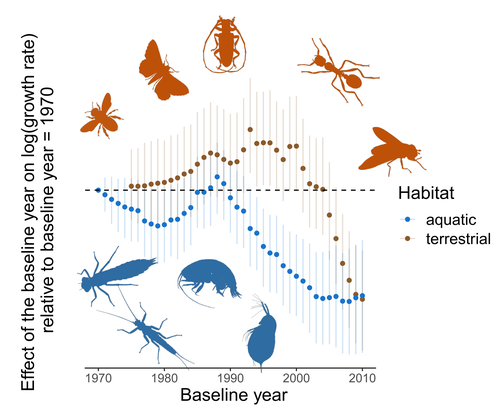
LOVEI Gabor L
- Agroecology, Aarhus University, Slagelse, Denmark
- Agroecology, Behaviour & Ethology, Biodiversity, Biogeography, Biological control, Biological invasions, Climate change, Coexistence, Colonization, Community ecology, Conservation biology, Eco-evolutionary dynamics, Ecosystem functioning, Ecotoxicology, Evolutionary ecology, Experimental ecology, Facilitation & Mutualism, Food webs, Foraging, Habitat selection, Herbivory, Human impact, Interaction networks, Landscape ecology, Life history, Macroecology, Meta-analyses, Molecular ecology, Physiology, Pollination, Population ecology, Species distributions, Statistical ecology, Symbiosis, Taxonomy, Terrestrial ecology, Theoretical ecology, Tropical ecology, Zoology
Recommendations: 0
Review: 1
Review: 1

Controversy over the decline of arthropods: a matter of temporal baseline?
Don't jump to conclusions on arthropod abundance dynamics without appropriate data
Recommended by Tim Coulson based on reviews by Gabor L Lovei and 1 anonymous reviewerHumans are dramatically modifying many aspects of our planet via increasing concentrations of carbon dioxide in the atmosphere, patterns of land-use change, and unsustainable exploitation of the planet’s resources. These changes impact the abundance of species of wild organisms, with winners and losers. Identifying how different species and groups of species are influenced by anthropogenic activity in different biomes, continents, and habitats, has become a pressing scientific question with many publications reporting analyses of disparate data on species population sizes. Many conclusions are based on the linear analysis of rather short time series of organismal abundances.
There has been particular interest in how arthropods are impacted by environmental change, with several recent papers reporting contradictory results. To investigate why these contradictions might arise, Duchenne et al. (2022) conducted an analysis of four published data sets along with a series of experimental analyses of simulated time series to examine the power of widely used statistical analyses to gain inference on temporal trends. Their important paper reveals that accurate inference on dynamics, particularly of species that exhibit large temporal fluctuations in abundance, requires time series that are substantially longer than are typically collected, as well as careful thought as to whether linear models are appropriate. Linear analyses of short time series are susceptible to providing unreliable inference as trends can be strongly influenced by points at either end of the time series.
Duchenne et al.’s paper provides important insight on the conditions when strong inference on temporal trends of arthropod (and other species) abundances can be made, and when they should be treated with caution. They do not doubt that many insect and arachnid species are changing their abundances, and that patterns in these changes may vary spatially. What their results do say is that we should treat grand claims of population recovery or rapid declines apparently to extinction with caution when they are based on short time series, particularly of species that show significant boom and bust dynamics. In many ways, these results are not unexpected, but it is nice to see such careful and thoughtful analyses and interpretation. More data are required for most arthropod species before clear assessments of abundance trends can be made. Given our reliance on many arthropods for food, pollination, and numerous ecosystem services, and the ability of other species to spread devastating human diseases such as dengue and malaria, it is advisable that we slow our modification of their habitats while additional data are collected to allow us to better characterise the trajectory of arthropod populations to understand what the consequences of our actions on the natural world are likely to be.
References
Duchenne F, Porcher E, Mihoub J-B, Loïs G, Fontaine C (2022) Controversy over the decline of arthropods: a matter of temporal baseline? bioRxiv, 2022.02.09.479422, ver. 3 peer-reviewed and recommended by Peer Community in Ecology. https://doi.org/10.1101/2022.02.09.479422